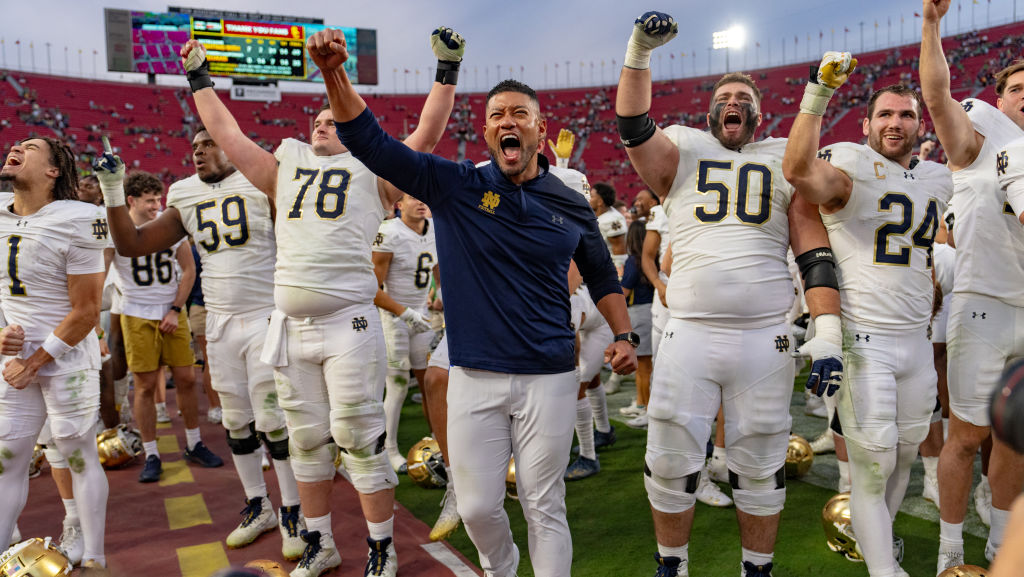
With only two teams left in this year’s college football playoffs, 2025 offers a historical moment: the Jan. 20 College Football Playoff national championship game will have its first Black head coach ever.
That’s because Marcus Freeman, head coach of the Notre Dame Fighting Irish is Black. Freeman will lead his team into battle at Mercedes-Benz Stadium in Atlanta on Monday, taking on the Ohio State Buckeyes.
Along with his father being African American, Freeman’s mom is South Korean, so he’ll also become the first Asian American coach to compete in a national championship game.
RELATED: 5 Reasons You’re Probably Not Watching NBA Games Anymore
“It is an honor, and I hope all coaches — minorities, Black, Asian, white, it doesn’t matter, great people — continue to get opportunities to lead young men like this,” Freeman said after winning the Orange Bowl last week. In that game, he coached his team to victory over Penn State, a team led by James Franklin, who is also Black.
The game will also take place on the same day as the presidential inauguration of Donald Trump.
There is the side of me who internally struggles with valuing the significance of Coach Freeman making history like this. I can’t help but sometimes wonder if the Black community has bigger fish to fry.
Knowing that Freeman will be coaching in the national championship game before a national television audience will be a cold comfort for Black folks as our country enters a period of corporate DEI rollbacks. The game will also take place on the same day as the presidential inauguration of Donald Trump, who brings his track record of attacking DEI, demonizing Haitian immigrants, and encouraging anti-Black racism back to the White House.
I also struggle with the idea that in the year 2025, America still needs Coach Freeman to achieve something miraculous to further prove the intellect of the Black man — to again confirm our leadership capabilities and ability to guide groups of young men to success. The constant need to audition, prove, and validate an entire race should already be a thing of the past.
Why Aren’t There More Black Coaches?
College football has always been sluggish to embrace Black head coaches at predominantly white universities. This is not surprising, given that college football has, for the most part, been dominated by schools in the South, a region of this country with a long history of unethical and unequal treatment of Black folks.
In the press conference following Notre Dame’s Sugar Bowl victory on New Year’s Day, Coach Freeman was asked by the Times-Picayune of New Orleans what it meant to be one of, at the time, two Black coaches in the college football playoffs. “It’s a reminder that you are a representation for others and many of the players that look the same way I do,” said Freeman. “Your color shouldn’t matter, right? The evidence of your work should.”
I wish that that evidence truly led to a greater number of opportunities for Black Head football coaches in college football, but the numbers say it hasn’t.
Heading into the 2024 season, in the Power 4 college football conferences (SEC, ACC, Big Ten, Big 12), only eight of the 68 head coaches are Black, with another three being non-Black minorities.
The big bad Southeastern Conference, known for its dominance on the college football gridiron, currently has zero black coaches leading college football programs. Overall, there were only 16 Black head coaches in the entire 134 Football Bowl Subdivision — formerly known as Division I — schools.
At first glance, it might seem that because so many African Americans have excelled in football because of their athletic prowess and knowledge of the game, it would be natural for their success to translate into leadership roles. Typically, the offensive coordinator — often a former quarterback or quarterback coach — is next in line for a head coaching job. And with more and more Black quarterbacks being given opportunities in college football and the NFL, it seems natural that this would lead to an increase in Black head coaching opportunities.
That’s not what’s happening. Not even the evolution of the Black quarterback and elevation of Black men to playing maybe the most important position in sports has led to a significant increase in Blacks coaching young Black men to victory for America’s most prestigious, predominantly white, athletic institutions.
Things Are Very Different at HBCUs
I grew up in the Crescent City — New Orleans —in the 1980s, attending the famed Bayou Classic, an HBCU college football event that could rival a Mardi Gras parade for Black Louisianans. Watching my Mother’s Alma Mater, Southern University, get pummeled by Grambling State University for four straight years from 1983-1986 still brings back traumatic memories. Grambling State was guided by the legendary Eddie Robinson, one of college football’s greatest coaches who led the Tigers from the sideline for an incredible 55 years.
At 7-years-old, I was already familiar with Black college football coaching excellence. Is it really that significant that Penn State’s Coach Franklin became the first head coach to win 100 games at the FBS level? Was that more impressive than when Grambling’s Eddie Robinson was once the winningest coach in college football history — and did so at an HBCU school?
Maybe we should focus on the success of former NFL players now at HBCUs, like Michael Vick, the newly named head coach at Norfolk State, and Desean Jackson, the new head coach at Delaware State. Maybe leading these Historically Black institutions, devoid of the resources and funding to compete on a higher level, should be the real ask.
Being First Opens the Door
Regardless, it would be foolish to ignore the premise that if Coach Freeman at Notre Dame wins on Jan. 20, it could potentially pave the way for more opportunities for Black coaches to lead Power 4 schools to success. That’s a chance that, frankly, should’ve been afforded to several capable Black men a long time ago. Pardon me for not feeling grateful.
I remember John Thompson becoming the first Black basketball coach to win an NCAA National Championship in 1984. I remember Doug Williams becoming the first Black quarterback to win the Superbowl in 1988. I remember in 1989 when Art Shell became the first Black head coach in the modern NFL era. It even took until 2004 for Coach Sylvester Croom to become the first Black head football coach in the SEC when he was hired at Mississippi State.
I’ve lived through all of this. But I look forward to a day when Black coaches can no longer make history, because any of their accolades and feats that we try to attach to “first” will already be history.
This post was originally published on this site be sure to check out more of their content.






